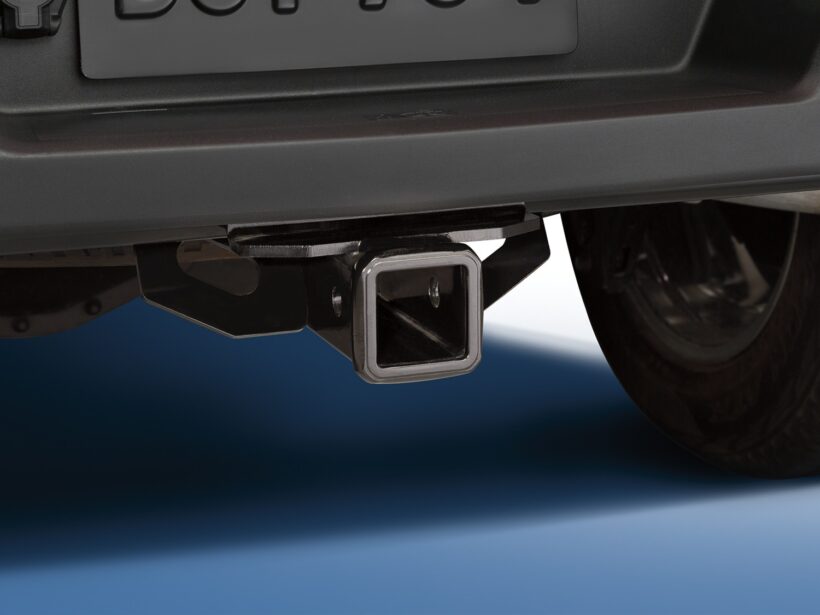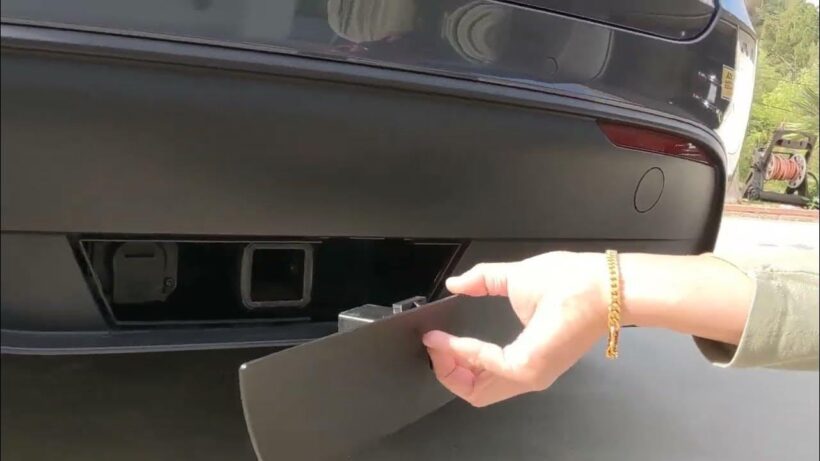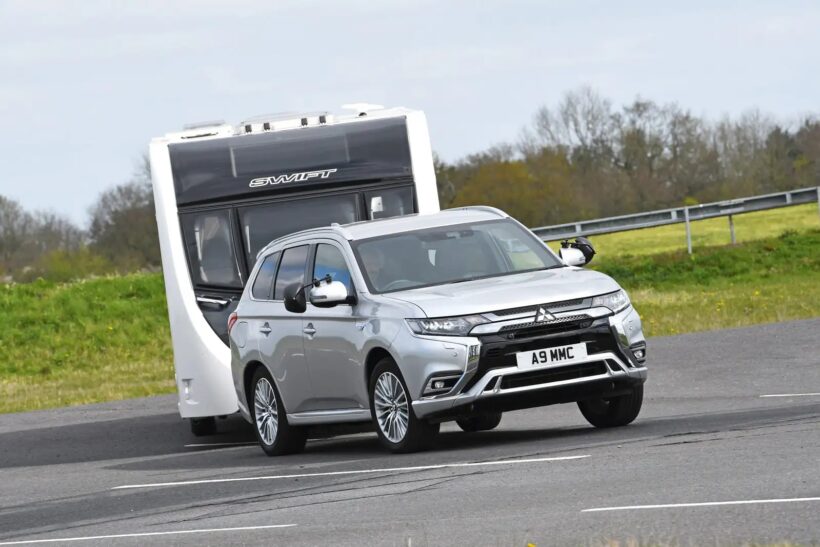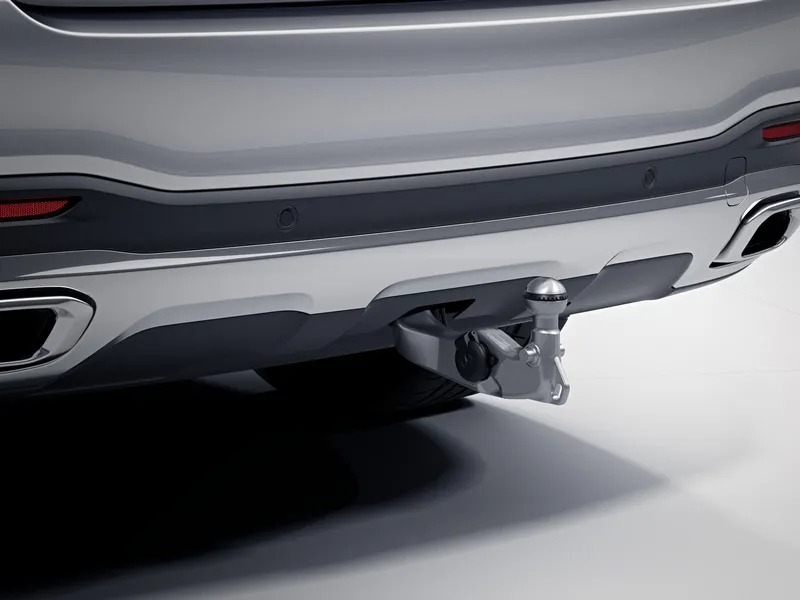As electric (EV) and hybrid vehicles become more popular, many drivers are discovering the convenience and eco-friendliness these vehicles offer. However, one aspect of vehicle ownership that often raises questions is towing capability.
More specifically, potential EV and hybrid owners wonder if there are special trailer hitch receivers designed to meet the unique needs of these vehicles.
In this blog post, we’ll explore whether there are specialized trailer hitch receivers for electric or hybrid vehicles and how they differ from those used for traditional internal combustion engine (ICE) vehicles. We will also look at the potential challenges and considerations when towing with an electric or hybrid car.
What is a Trailer Hitch Receiver?

Before diving into specifics, it’s important to understand what a trailer hitch receiver is and how it works. A trailer hitch receiver is a metal component that attaches to the rear of a vehicle.
It’s designed to connect a trailer or towing accessory, such as a bike rack or cargo carrier.
The receiver typically has a square opening that can accommodate various towing accessories, such as a ball mount or hitch.
The hitch receiver comes in various sizes, with the most common being 1.25-inch, 2-inch, and 2.5-inch receivers, depending on the weight of the towing load. Hitch receivers are generally classified by their towing capacity, which is linked to the vehicle’s design, frame strength, and drivetrain.
Are There Specific Hitch Receivers for Electric and Hybrid Vehicles?
The short answer is yes, but there are some considerations that differentiate these vehicles from traditional gasoline-powered ones when it comes to trailer hitch receivers.
1. Vehicle Structure and Design
Electric and hybrid vehicles are often designed with lightweight materials, lower ground clearance, and specialized components like large battery packs. These design features can impact how a trailer hitch receiver is mounted to the vehicle and the overall towing capacity.
Many EV and hybrid vehicles feature smaller, more compact frames compared to their traditional counterparts. As a result, not all standard trailer hitch receivers designed for internal combustion vehicles will be compatible with EVs or hybrids without modification.
For instance, some electric vehicles may not have a frame structure robust enough to support the stresses of towing a heavy trailer. In these cases, manufacturers may design specific trailer hitch receivers that are tailored to the vehicle’s lighter and more compact frame, ensuring proper alignment and secure attachment for towing accessories.
2. Towing Capacity Considerations

Electric and hybrid vehicles have different towing capacities than traditional vehicles. When designing a trailer hitch receiver for these vehicles, manufacturers must consider factors such as the battery’s weight, the drivetrain configuration, and how much weight can safely be pulled without overloading the electric motors or compromising range.
For instance, the Tesla Model X is one of the few fully electric vehicles equipped with a towing capability of up to 5,000 pounds, thanks to its powerful electric motors. However, not all electric vehicles are designed for towing, and some may have much lower towing capacities, often below 1,000 pounds.
Because towing a trailer or heavy load can significantly reduce an EV’s driving range (due to the increased power draw), specialized trailer hitch receivers for electric vehicles might come with features like a stabilizing system to prevent excessive strain on the vehicle’s suspension and electrical components.
3. Aerodynamics and Charging Ports
Another factor that affects the design of trailer hitch receivers for electric and hybrid vehicles is aerodynamics. Electric vehicles often prioritize aerodynamic efficiency to maximize range, and towing can disrupt the airflow dynamics. Some EV-specific hitch receivers are designed to be more streamlined to maintain the vehicle’s aerodynamic integrity while towing.
Furthermore, many electric and hybrid vehicles feature rear charging ports, and the placement of these ports can impact where a trailer hitch receiver can be mounted. Manufacturers may create specialized hitch receivers that avoid obstructing these charging ports, ensuring that drivers can still charge their vehicles without removing or disconnecting the hitch.
4. Charging and Tow Assist Integration
Some electric and hybrid vehicles come with advanced driving assist features and integrated towing technologies, such as automatic braking or torque vectoring. In these cases, the hitch receiver may be part of a broader system that includes tow assist technology.
For example, the Ford F-150 Lightning, an electric pickup truck, offers integrated towing features that enhance the vehicle’s stability and control while hauling a load. A hitch receiver for this truck might be designed to work seamlessly with its tow assist system to provide safer and more efficient towing experiences.
5. Availability and Aftermarket Options
Currently, the availability of specialized trailer hitch receivers for electric or hybrid vehicles is somewhat limited, especially for models that are not typically marketed for towing. However, there are aftermarket options that cater specifically to hybrid and electric vehicles. These aftermarket manufacturers create products that can accommodate the unique needs of these vehicles without compromising safety or performance.
For example, for hybrid vehicles like the Toyota Prius, many aftermarket hitch receiver options are available, though towing capacity will be significantly lower than that of a full-size truck or SUV. These aftermarket hitches are designed with consideration for the Prius’s unique frame and lower towing capacity.
What Should You Consider Before Towing With an EV or Hybrid?

If you’re considering towing with your electric or hybrid vehicle, there are several factors to keep in mind:
- Towing Capacity: Always check your vehicle’s towing capacity, as overloading could damage the drivetrain and other components.
- Range Impact: Towing a trailer can reduce your EV’s range. Make sure you plan your routes accordingly, as towing can drain the battery faster.
- Suspension and Load Distribution: Be aware of how towing impacts your vehicle’s suspension and balance. A proper trailer hitch receiver designed for your vehicle can help distribute the load evenly and prevent unnecessary strain on the vehicle.
- Manufacturer Recommendations: Always check with the vehicle manufacturer or a professional installer to ensure that the trailer hitch receiver you’re using is compatible with your electric or hybrid vehicle.
Conclusion
While there are not many “special” trailer hitch receivers designed solely for electric or hybrid vehicles, manufacturers and aftermarket brands are creating more products that meet the specific needs of these vehicles. These hitches are carefully designed to account for weight distribution, aerodynamics, and safety features to ensure compatibility with the unique structures and performance characteristics of EVs and hybrids.
If you’re looking to tow with your electric or hybrid vehicle, it’s essential to choose the right trailer hitch receiver, be aware of your vehicle’s limitations, and always prioritize safety.

